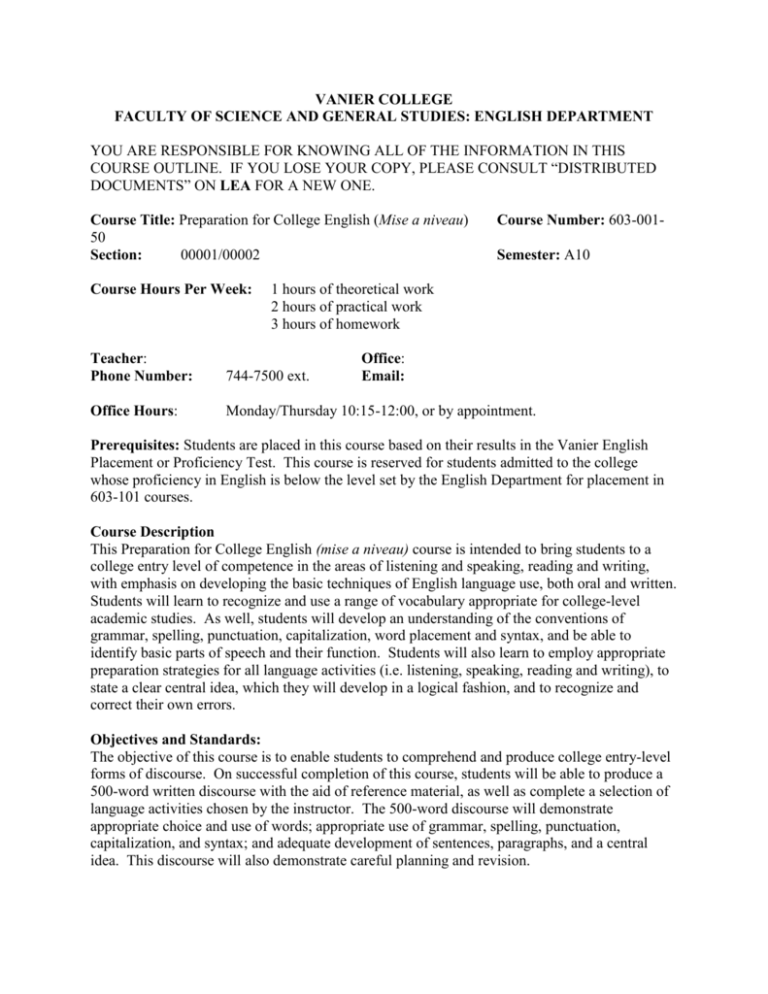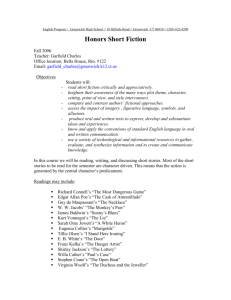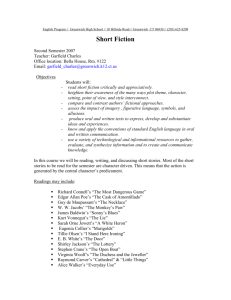
VANIER COLLEGE
FACULTY OF SCIENCE AND GENERAL STUDIES: ENGLISH DEPARTMENT
YOU ARE RESPONSIBLE FOR KNOWING ALL OF THE INFORMATION IN THIS
COURSE OUTLINE. IF YOU LOSE YOUR COPY, PLEASE CONSULT “DISTRIBUTED
DOCUMENTS” ON LEA FOR A NEW ONE.
Course Title: Preparation for College English (Mise a niveau)
50
Section:
00001/00002
Course Hours Per Week:
Course Number: 603-001Semester: A10
1 hours of theoretical work
2 hours of practical work
3 hours of homework
Teacher:
Phone Number:
744-7500 ext.
Office:
Email:
Office Hours:
Monday/Thursday 10:15-12:00, or by appointment.
Prerequisites: Students are placed in this course based on their results in the Vanier English
Placement or Proficiency Test. This course is reserved for students admitted to the college
whose proficiency in English is below the level set by the English Department for placement in
603-101 courses.
Course Description
This Preparation for College English (mise a niveau) course is intended to bring students to a
college entry level of competence in the areas of listening and speaking, reading and writing,
with emphasis on developing the basic techniques of English language use, both oral and written.
Students will learn to recognize and use a range of vocabulary appropriate for college-level
academic studies. As well, students will develop an understanding of the conventions of
grammar, spelling, punctuation, capitalization, word placement and syntax, and be able to
identify basic parts of speech and their function. Students will also learn to employ appropriate
preparation strategies for all language activities (i.e. listening, speaking, reading and writing), to
state a clear central idea, which they will develop in a logical fashion, and to recognize and
correct their own errors.
Objectives and Standards:
The objective of this course is to enable students to comprehend and produce college entry-level
forms of discourse. On successful completion of this course, students will be able to produce a
500-word written discourse with the aid of reference material, as well as complete a selection of
language activities chosen by the instructor. The 500-word discourse will demonstrate
appropriate choice and use of words; appropriate use of grammar, spelling, punctuation,
capitalization, and syntax; and adequate development of sentences, paragraphs, and a central
idea. This discourse will also demonstrate careful planning and revision.
Methodology
Students will read a variety of fiction and non-fiction texts that explore different ideas and issues.
Based on these readings, students will engage in activities that will help develop their oral and
written English language skills and help them to express their own ideas clearly. These activities
will include individual responses, presentations and exercises, and pair or small group
discussions, responses, and exercises. Grammar activities will enhance the writing and thinking
process. Oral presentation activities will give students the chance to express themselves in front
of their peers. The three major essays will help students demonstrate the skills they have
learned.
Bibliography
Gaetz, Lynn. Brass Tacks: Integrated Skills in English. Scarborough, Ont.: Prentice Hall Allyn
and Bacon Canada, 1998.
Preparation for College English: Readings and Study Guide. Compiled by Dana Bath. Vanier
College Press: Montreal, 2010.
Vanier Student Writing Guide: available online at
http://www.vaniercollege.qc.ca/tlc/tlc/writeguide/
WritingGuide.htm
A college-level English dictionary.
Evaluation
Grammar quizzes:
Homework and in-class mini-assignments:
Oral presentation
Two 300-word essays
Narrative essay:
In-class version:
10%
Rewrite:
5%
Literary analysis essay:
In-class version:
10%
Rewrite:
5%
Final 500-word in-class opinion essay
Final in-class grammar test:
15%
15%
10%
30%
20%
10%
Homework and in-class mini-assignments
Any assignment for which you receive a signature instead of a percentage grade will be
counted in your “Homework and in-class mini-assignments” mark.
Some of these assignments will be done in groups, but if you are clearly depending on other
group members to do the assignment for you, or if you do not follow the assignment
guidelines properly, you will receive no credit.
Each thoroughly, thoughtfully completed assignment will receive a point. At the end of
term, your points will be divided by the total number of assignments, and converted to a
grade out of 15%.
If you are absent for valid, documented reasons and miss in-class work, you can usually
make up the work outside of class and hand it in before the date I specify (immediately
following the assignment, and usually before the following class; not at the end of the term.)
You need to contact me before the next class in order to make arrangements to make up
missed work. If making up the work is not possible due to the nature of the assignment, you
will be given an alternate assignment or, in rare cases, excused from the work.
If you have no acceptable documentation for your absence, making work up will not be
possible.
Due Date Policy
All hard-copy assignments must be handed in on the date specified, before the end of class
time. Assignments submitted online must be received before the date and time indicated in
the assignment guidelines.
If you don’t give me your hard-copy assignment in person (if you put it under my office door
or in internal mail), please email me a copy through LEA so that I will know when you
submitted it. Otherwise, I will consider your assignment “handed in” on the date when I
receive it (and that might be days later.) It is your responsibility to ensure that I have
received your emailed assignment and your hard copy. YOU are responsible for keeping a
copy of your assignment, and being able to re-submit it, in the unlikely event that it is
misplaced.
5% will be deducted from the assignment mark for each day the assignment is late.
If you have the option of rewriting an assignment, and choose to do so, any late penalty
applied to your original assignment will be applied to your rewrite as well.
Assignments more than one week late will not be accepted and will receive a grade of 0%.
Extensions will be given only in exceptional circumstances, and will not be given on or after
the day the assignment is due.
Attendance
Regular attendance and active participation are required throughout the term. Missing more
than 10% of in-class work without a valid reason seriously jeopardizes a student’s chance of
passing the course. Students who miss 20% of in-class work will likely fail.
Students who will be absent from classes for religious reasons must inform me, in writing, of
the dates of these holidays before Thursday, Sept.2, 2010, and immediately make
arrangements to make up the work missed. These students will not then be penalized for
these absences. Please inform ALL your teachers at the beginning of term of any such
absences.
Students with justifiable absences must submit original and verifiable documentation, such as
a medical note, upon their return to class.
Students are always responsible for any homework assigned during their absence, including
absences for medical and religious reasons. “I wasn’t here last class” is not an excuse for not
doing the readings or homework, and you will not be exempt from assignments just because
you weren’t here when they were announced.
If you miss class, LEA (see below) is the first place you should check for information about
what you missed and what you need to do to prepare for next class. You can also email me at
any time with any questions.
Our Friend LEA
Please familiarize yourself with LEA, the online classroom accessible through Omnivox.
When I need to contact you, I will usually do so through MIO, LEA’s messaging system.
Please check your MIO messages regularly, and please contact me through MIO when you
can. (You can program MIO to email you when you have a new MIO message.)
Class notes and information about class activities will sometimes be posted on LEA a day or
two after class. These notes are not a replacement for your own in-class notes, but are meant
to help students who have missed class, and those who wish to review.
All assignment guidelines will be posted on LEA, as will many of the class handouts.
You may sometimes be required to submit assignments through LEA.
Some of your homework/in-class assignments may be done as group or individual work on
LEA’s “Class Forum.”
Cheating and Plagiarism Policy:
Any form of cheating or plagiarism will result in a grade of zero on the test or assignment,
and a letter from the teacher will be placed in your file. A repeated offence may lead to even
more serious consequences. Please consult The Vanier Student Writing Guide, the Vanier
College Catalogue, the Student Handbook and your teacher for more information.
Plagiarism includes copying someone else’s work, receiving unauthorized help with your
work, or presenting someone else’s work as your own in any fashion, including using
reference material without documenting sources. Cheating includes plagiarism and any other
dishonest or deceptive practice regarding in-class or at-home work, including the use of
unauthorized class notes, the exchange of answers (either orally, in writing, or through other
means) with someone else, the copying of someone else’s work, or the use of electronic aids
when not permitted, among other things.
Any attempt to gain unfair advantage on work done for credit by violating established rules
and procedures is dishonest and will not be tolerated. Cheating is a very serious academic
offense and can have permanent repercussions for your academic career.
Classroom Conduct:
Please turn off all cell phone ringers and music players before entering the classroom.
If you use a laptop or other electronic device for taking notes, please use it responsibly.
Don’t distract others or use it for web surfing, Facebooking etc.
You are expected to come to class prepared: bring your books, as well as paper and writing
instruments, and do the required reading. “I don’t have my books” is not an excuse for not
doing the work. There may be instances when being unprepared means you have to leave the
class.
Participate in all classroom activities; a lack of participation on your part affects the
productivity of other students, particularly where group work is concerned, and will affect
your preparedness for your assignments.
Discussion, including disagreement, must be conducted with civility and mutual respect.
If you enter late, do so without disturbing others; if you absolutely must leave early, please
inform me at the beginning of class.
Please see the IPESA explanation of “Rights and Responsibilities of the Vanier Community”
(included in your student handbook) for further explanation.
Mediation and Grades Review:
Students are reminded that the English Department has two committees that deal with student
complaints. The Grades Review Board reviews complaints concerning the grading of
assignments, and the Mediation Committee reviews complaints other than those dealing with
student grades. Information on how to contact these committees is available from your teacher,
the English Department Coordinator, and the office of the Faculty of Science and General
Studies.
VANIER COLLEGE
FACULTY OF SCIENCE AND GENERAL STUDIES: ENGLISH DEPARTMENT
Course Title: Preparation for College English (Mise a niveau)
Course Number: 603-002-06 [90 hours]
Section:
Semester: Summer 2009
Course Hours Per Week:
3 hours of theoretical work
3 hours of practical work
6 hours of homework
Teacher:
Email: name@vaniercollege.qc.ca
Prerequisites: Students are placed in this course based on their results in the Vanier English
Placement or Proficiency Test. This course is reserved for students admitted to the college
whose proficiency in English is below the level set by the English Department for placement in
603-101 courses.
Course Description: This Preparation for College English (mise a niveau1) course is intended to
bring students to a college entry level of competence in the areas of listening and speaking,
reading and writing, with emphasis on developing the basic techniques of English language use - both oral and written. Students will learn to recognize and use a range of vocabulary
appropriate for college-level academic studies. As well, students will develop an understanding
of the conventions of grammar, spelling, punctuation, capitalization, word placement and syntax,
and be able to identify basic parts of speech and their function. Students will also learn to
employ appropriate preparation strategies for all language activities (i.e. listening, speaking,
reading and writing), to state a clear central idea, which they will develop in a logical fashion,
and to recognize and correct their own errors.
Objectives and Standards: The objective of this course is to enable students to comprehend and
produce college entry-level forms of discourse. On successful completion of this course, students
will be able to produce a 500-word written discourse with the aid of reference material, as well
as complete a selection of language activities chosen by the instructor. The 500-word discourse
will demonstrate appropriate choice and use of words; appropriate use of grammar, spelling,
punctuation, capitalization, and syntax; and adequate development of sentences, paragraphs, and
a central idea. This discourse will also demonstrate careful planning and revision.
Methodology: Students will improve speaking, reading, writing and listening skills in English
through a variety of activities and assignments.
1
Reading: Students will read a variety of texts which explore different ideas and issues.
A Mise a niveau course is a non-credit course required to raise a student's skill in English or other subjects.
Based on these readings, students will engage in activities which will help develop their
oral and written English language skills and help them to express their own ideas clearly.
These activities will include individual and pair/small group responses and exercises (e.g.
comprehension & vocabulary exercises, paraphrasing & summarizing, journal entries).
Writing: Students will receive extensive academic writing practice with the goal of writing
a coherent essay with a clear thesis and structure. Writing assignments will be part of a
larger process involving pre-writing, drafting, peer editing, conferencing and revision. In
the process of drafting and revising their writing, students will also learn how to edit each
other’s work. Class activities will include a combination of whole class, individual and
pair or small group work. Finally, students will write journal entries, based on readings
and personal experiences.
Grammar will be integrated throughout with a focus on common errors from student
writing. Students will be responsible for using online media such as Lea in order to keep
track of assignments and progress and will also avail themselves of the supplemental links
and resources provided by the instructor.
Oral presentation activities will give students the chance to express themselves in front of
their peers.
Bibliography:
Gaetz, Lynne. Open Road English Skills and Open Road English Grammar. Saint-Laurent,
Québec: Pearson Longman, 2007. 2
A college-level English dictionary
Evaluation:
Quizzes, exercises, short assignments, and group projects3
Journals
Oral presentation
One in-class 200-300 word essay4
One in-class 300 word essay
One take-home 300 word essay
Final 500 word in-class essay
Final grammar test (in-class)
25%
5%
10%
5%
10%
10%
20%
15%
Cheating and Plagiarism Policy: Any form of cheating or plagiarism will result in a grade of
zero on the test or assignment, and a letter from the teacher will be placed in your file. A
repeated offence may lead to even more serious consequences. Please consult the Vanier
College Catalogue, the Student Handbook and your teacher for more information.
2
3
4
Additional readings or exercises will be distributed by the instructor.
(including grammar tests and exercises, reading tests and responses, dictations, shorter writing tasks and
other in- and out-of-class graded work)
This first essay will be a personal experience narrative essay which students can have published in Vanier’s
Voices from Around the World.
Attendance Policy: Regular attendance and active participation are required throughout the
summer. Missing more than 10% of in-class work without a valid reason seriously
jeopardizes a student’s chance of passing the course. Students who miss 20% (i.e. 4.5
classes or 18 hours) of in-class work will likely fail. Students who will be absent from classes
for religious reasons must inform their teacher, in writing at the beginning of the course, of the
dates of these holidays and make up the work missed. These students will not then be penalized
for these absences. Students with justifiable absences must submit original and verifiable
documentation, such as a medical note, upon their return to class. However, students are still
responsible for making up any work missed due to justifiable absences; therefore, they are
advised to exchange phone numbers with one or two other students in order to facilitate the
acquisition of important class information from their classmates. Please note that arriving late
or leaving early is considered a partial absence.
Submission of Assignments: All work must be handed in on the date specified, at the beginning
of class. Only hard copies will be accepted, unless otherwise indicated. Late work will result in a
5% deduction per day. Exceptions will be made only in the cases where the student has a
justifiable reason and can submit original and verifiable documentation, such as a medical note,
upon their return to class.
Classroom Etiquette: Students are expected to behave maturely and respectfully in class. Please
observe the following guidelines:
Arrive for class on time out of respect for your fellow classmates: students who enter the
classroom after class has begun distract both the students and the instructor. Also, keep in
mind that some quizzes will be given at the start of class, and if you miss part or all of a quiz
because of lateness, you will not be allowed to make it up.
Do not begin packing up your belongings before class has been dismissed.
If you must leave class early, please inform me ahead of time and take a seat close to the
door.
Do not engage in personal conversations during class. They are disruptive to other
students who are trying to learn and send the message to whomever is currently speaking that
you do not value what they are saying.
No reading newspapers, sleeping, or any other inappropriate behavior will be tolerated.
Cell phones must be turned off and placed in your bag.
No IPods, Mp3 players, cell phones or laptops are allowed in class.





![Submission 68 [doc]](http://s3.studylib.net/store/data/008000926_1-fed8eecce2c352250fd5345b7293db49-300x300.png)
